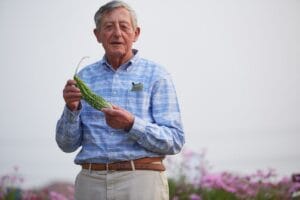Born in Enkhuizen, Netherlands, Groot was the sixth generation of his family business, Sluis & Groot, founded in 1867. A seed company, Sluis & Groot started with cabbage. Simon studied business economics at Erasmus University Rotterdam, then served two years as an officer in the Royal Dutch Army, and joined Sluis & Groot in 1958, and rose to become the company’s Director of Marketing. By then, it was also big into flower seeds.
As he traveled the world to sell seeds, Groot noticed that small farmers in developing countries, particularly in Asia, struggled with producing quality produce as their seed stock was not adapted to the local climate. That resulted in poor yields, leading to a cycle of malnutrition and poverty. Groot was critical of chemical food giants like Monsanto, Bayer, and Syngenta. “The greatest harm has been done by the introduction of patents on plants,” he said. “This has seriously reduced the grower’s freedom to innovate.” As Groot was trying to figure out what to do, how to help, Sluis & Groot decided to sell, and it was, in 1981, to Sandoz; it’s now owned by …Syngenta. [Monsanto later tried to buy Syngenta, but was rebuffed. It’s now wholly owned by China.]

Simon used the proceeds from his shares to start a new company that would eventually be called East-West Seed, showing his idea of a cooperative venture with countries of the east. He partnered with Benito Domingo, a Filipino seed trader. Groot was an expert in European seed technologies and marketing; Domingo was an expert Asian seed trader. Together they would work to provide high-quality, locally desirable vegetable seeds to small farmers. They hit the ground running in 1982, starting a 5 hectare (12.3 acre) farm they called Hortanova (“New Garden”) in Batangas, Philippines. By 1984, things were going well enough to expand, bringing in new partners from Thailand to establish the company’s first commercial vegetable breeding farm in the Chiang Mai valley.
The company’s first locally developed commercial vegetable hybrid was the Jade Star, introduced in 1986. A bitter gourd or melon originally from Africa, the Jade Star variety was easier to grow, produced better yields, and was resistant to mildew. It has been widely adapted into Asian cuisine, which transformed the market for farmers, providing higher incomes and more accessible produce for consumers. It is still one of the company’s main seed offerings today. Over the years, East-West Seed has expanded to India, Indonesia, Malaysia, Cambodia, Vietnam, Myanmar, and Bangladesh, as well as several African countries and Latin America. Today, the company sells seeds in over 80 markets worldwide, offering over 600 varieties of vegetable seeds.

The impact of Groot’s idea was profound: he was awarded the World Food Prize in 2019, an international award recognizing the achievements of individuals who have advanced human development by improving the quality, quantity, or availability of food in the world. It was conceived in 1986 by Norman Borlaug, who won the Nobel Peace Prize in 1970 for sparking the “Green Revolution” — a major initiative to improve the global food supply. “Like Dr. Norman Borlaug before him, Simon N. Groot has dedicated his life to improving the livelihoods of millions around the world,” said Ambassador Kenneth Quinn, President Emeritus of the World Food Prize Foundation, at the time. “As the use of his seeds spread throughout the Philippines and to Thailand, Indonesia and across Southeast Asia, farmers’ daily lives were uplifted and consumers benefitted from greater access to nutritious vegetables. Mr. Groot, in effect, developed a stunningly impactful global network of seed producers who are transforming the lives of farmers” — and, by extension, their customers.
“Seeds are the foundation of food security,” says Anton van Doornmalen, former director of Rijk Zwaan, another Netherlands-based seed company. “With relatively small investments, you can create massive value by developing better varieties and providing access to technology for smallholder farmers. You elevate local vegetable production and make a tangible difference. That’s always been Simon’s core message: this is where the food chain begins. We have a responsibility — and the tools — to do something about it. And Simon did, in every possible way.” Benito Domingo died in 2018 at 85. Simon Nanne Groot died July 6 in Enkhuizen. He was 90. East-West Seed remains a family-owned business, run by three of Simon’s four children.
